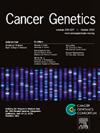Detection of VHL variant on multigene panel testing for hereditary breast cancer: Implications for genetic counselling
IF 2.1
4区 医学
Q4 GENETICS & HEREDITY
引用次数: 0
Abstract
As multigene panel genetic testing for hereditary cancer syndromes increases in clinical use, the detection of unexpected secondary findings will occur more commonly. We present the case of a 40-year-old woman with breast cancer who harboured a secondary finding in the VHL gene variant without other cancer risk alleles (e.g., BRCA1/BRCA2) sufficient to explain her primary presentation. Subsequent exam revealed ophthalmic manifestations of von Hippel-Lindau syndrome (VHLS), emphasizing the importance of multidisciplinary clinical assessment and phenotyping. The development of retinal and central nervous system hemangioblastomas, clear cell renal cell carcinomas, pancreatic neuroendocrine tumours and phaeochromocytomas are characteristic of VHLS, but the link with breast cancer is poorly understood. Though the benefit of hereditary cancer genetic testing is well-known, this case highlights the importance of pre-test genetic counselling to prepare patients for all possible results, including additional unanticipated genetic diagnoses. Such pre-test counselling can set appropriate expectations for the possible requirement of ongoing surveillance and/or treatment.
遗传性乳腺癌的多基因面板检测VHL变异:遗传咨询的意义
随着遗传性癌症综合征的多基因面板基因检测在临床应用的增加,意外的继发性发现将更常见。我们报告了一名40岁的乳腺癌女性,她在没有其他癌症风险等位基因(如BRCA1/BRCA2)的VHL基因变异中发现了继发性发现,足以解释她的原发性表现。随后的检查显示von Hippel-Lindau综合征(VHLS)的眼部表现,强调多学科临床评估和表型的重要性。视网膜和中枢神经系统血管母细胞瘤、透明细胞肾细胞癌、胰腺神经内分泌肿瘤和嗜铬细胞瘤的发展是VHLS的特征,但与乳腺癌的联系尚不清楚。虽然遗传性癌症基因检测的好处是众所周知的,但这个病例强调了检测前遗传咨询的重要性,以使患者为所有可能的结果做好准备,包括额外的意外遗传诊断。这种测试前咨询可以为持续监测和/或治疗的可能需求设定适当的期望。
本文章由计算机程序翻译,如有差异,请以英文原文为准。
求助全文
约1分钟内获得全文
求助全文
来源期刊

Cancer Genetics
ONCOLOGY-GENETICS & HEREDITY
CiteScore
3.20
自引率
5.30%
发文量
167
审稿时长
27 days
期刊介绍:
The aim of Cancer Genetics is to publish high quality scientific papers on the cellular, genetic and molecular aspects of cancer, including cancer predisposition and clinical diagnostic applications. Specific areas of interest include descriptions of new chromosomal, molecular or epigenetic alterations in benign and malignant diseases; novel laboratory approaches for identification and characterization of chromosomal rearrangements or genomic alterations in cancer cells; correlation of genetic changes with pathology and clinical presentation; and the molecular genetics of cancer predisposition. To reach a basic science and clinical multidisciplinary audience, we welcome original full-length articles, reviews, meeting summaries, brief reports, and letters to the editor.
 求助内容:
求助内容: 应助结果提醒方式:
应助结果提醒方式:


